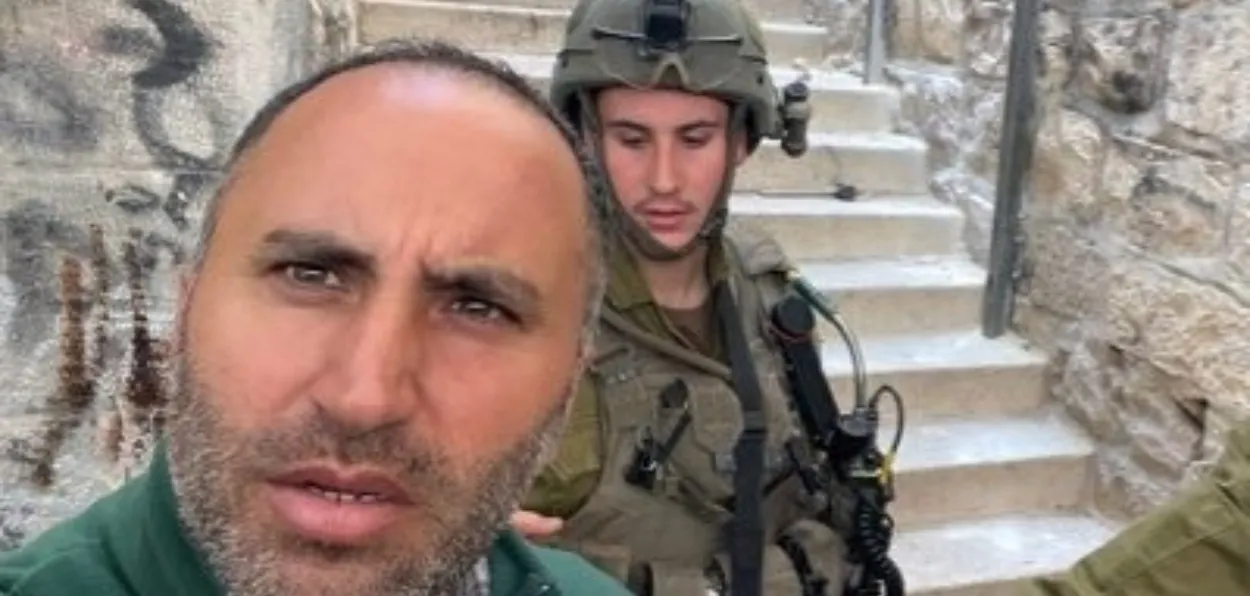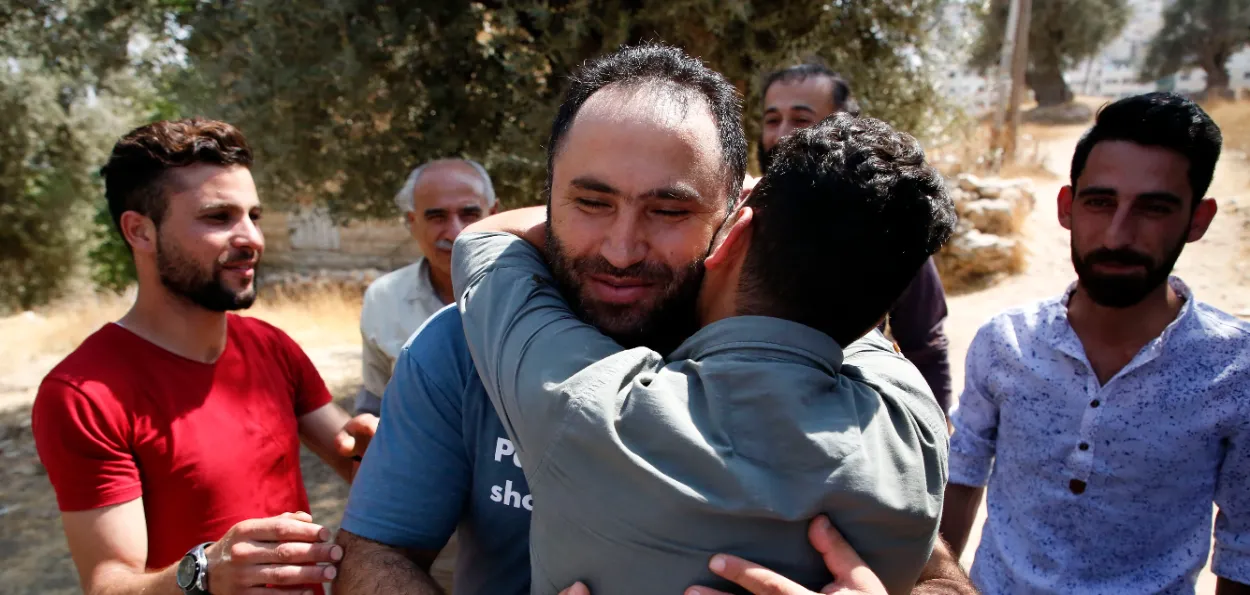
New Delhi
“I have three choices: to use violence and I will be the hero of Palestine for one month; to accept to live under occupation and accept to be a slave; or to fight the occupation using non-violent resistance. So you choose: everybody would choose to fight using non-violence.”
This is what Palestinian activist Issa Amro said while giving his assent to accepting the Right Livelihood prize — considered as an alternative Nobel — for his “nonviolent resistance to Israel’s illegal occupation.”
The 44-year-old Palestinian pacifist Issa Amro hails from Hebron, a city in the West Bank where tensions are common because of the overwhelming protection offered by Israeli soldiers to about 800 Jewish settlers amid some 2 lakh Palestinians.
The website of Youth Against Settlement (YAS) co-founded by Amro to launch a peaceful movement against Israeli settlement says, “ From the beginning, Amro has been committed to non-violence as the most effective means of resisting the occupation. He studied global non-violent movements, particularly those led by Mahatma Gandhi, Martin Luther King Jr., and fellow Right Livelihood laureate Gene Sharp; used their methods to shape YAS’s strategy.”
Issa Amro with his supporters in Hebron, West Bank
The rights campaigner Issa Amro has been repeatedly detained and tortured by both the Palestinian Authority, previously PLO, and Israel, the foundation said.
“It’s a miracle that I still exist,” said Amro.
When Palestine Polytechnic University, where he was studying, closed in 2003 during the Second Intifada, Amro successfully led a six-month civil disobedience campaign.
“I managed to reopen the university with other students,” Amro said in a statement. “I graduated as an engineer and as an activist — it became part of my character,” he added.
The Sweden-based Right Livelihood Foundation also honoured Joan Carling, a Filipina champion of Indigenous rights, and Anabela Lemos, a climate activist from Mozambique for making a huge impact on their communities through non-violent ways.
The prestigious Swedish award will be conferred on Issa Amro in December at Stockholm.
Speaking with the Media, Amro said he doesn’t justify any form of violence and cried in the face of the Hamas's attack (On Israeli civilians).
Issa Amro
"I want to say it out loud: the majority of Palestinians are against the kidnapping of Israeli hostages," he said. "We cried when we saw the kidnapped civilians because we are going through the same thing."
The Palestinian territory of the West Bank has been subjected to Israeli military occupation since the 1967 Six-Day War. The settlements are illegal under international law, a determination which was strengthened in July 2024, when the top UN court issued an advisory opinion concluding that Israel’s occupation, settlements, and annexation of Palestinian territories are unlawful. The court also noted that Israeli measures were in breach of the international prohibition on racial segregation and apartheid.
Born in 1980, Amro spent his early life studying – and on the football pitch – with dreams of becoming an engineering professor. However, several key events, including the 1994 Ibrahimi Mosque massacre, where an Israeli extremist opened fire at a Hebron mosque killing 29 people and injuring 125, opened his eyes to the harsh realities of Israeli settler terror and led him to seek ways to contribute to the Palestinian cause.
The 2003 closure of his university, Palestine Polytechnic University, during the Second Intifada was a turning point for Amro. What started as a desire to continue his studies became a movement, as he led fellow students in a six-month civil disobedience campaign to reopen the university, marking the beginning of his lifelong commitment to activism.
“I managed to reopen the university with other students,” Amro said. “I graduated as an engineer and as an activist: it became part of my character.”
After university, Amro joined the Israeli human rights organization B’Tselem, which has long been involved in documenting human rights violations in the Israeli-occupied Palestinian territories.
In 2007, Amro established YAS, aiming to give Palestinians a stronger voice in the struggle against the occupation. The group’s primary goal is to mobilise Palestinians of all ages, but especially the youth, to resist the Israeli occupation peacefully and to reject the use of violence.
YAS quickly became a unifying force for Palestinians from various political backgrounds, promoting unity and peaceful resistance without aligning with any political party.
The group’s work includes documenting injustices and providing legal support to Palestinians. They also organise protests, raise global attention by giving advocacy tours for international delegations, and support local families in Hebron through home repairs and community-building initiatives. As of 2024, YAS was operating with about 25 activists.
 A supporter embraces Issa Amro
A supporter embraces Issa Amro
One of YAS’s most significant achievements has been the Open Shuhada Street Campaign, which commemorates the 1994 Ibrahimi Mosque massacre and calls for the reopening of the city’s main street, which remains closed to Palestinians. This campaign has gained international attention, with hundreds of actions and protests organised globally.
Another innovative programme has been the Camera Distribution Project, which Amro began in 2006 while still working for B’Tselem. Aiming to distribute 20,000 cameras to Palestinian families in Hebron, Amro encouraged them to document the violence they faced from Israeli settlers and soldiers.
Initially, many families were hesitant, fearing that using cameras would make them targets. However, as the project gained traction and more incidents of violence were captured on film, it became a powerful tool for exposing the occupation to the world. Today, the culture of documentation has become widespread in Hebron, with residents using smartphones to capture abuses and seek to hold Israeli forces accountable.
To this day, Amro trains university students on how and what to film while also urging them to capture their daily lives, including the things they enjoy.
Amro faced numerous challenges from both the Israeli military and the Palestinian Authority (PA) while being constantly harassed by Israeli settlers.
He has been frequently arrested and tortured by the Israeli military. On October 7, 2023, Amro was detained, beaten, and tortured by Israeli soldiers, even though he has always been an outspoken critic of Hamas and has no affiliation with the group.
He has often been a target of the Palestinian Authority, the government party of the West Bank.
ALSO READ: Navratri: Festival that reminds society of Indian women's power
He was detained and tortured by the PA for his demand for reforms and democracy within the Palestinian leadership. They have tried to discredit him by saying that he was a spy for European countries and agencies.
